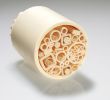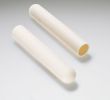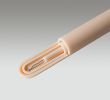Alumina protective sheaths
Alumina sleeves are tubes that are plugged at one end. The choice of aluminum oxide as a material allows these tubes to be used for very demanding applications such as electrical insulation at very high temperatures. This is why they are used as a protective sheath for thermocouples, used for temperature measurement. Alumina is a refractory material: this technical ceramic can withstand temperatures of up to 1950 °C. It is also highly resistant to wear and corrosion. Our ducts are generally manufactured by extrusion: alumina is shaped by extrusion before being sintered. For small liners, the end is closed by hand in order to obtain a monobloc part after sintering. Large sheaths are obtained by cold isostatic pressing (CIP).
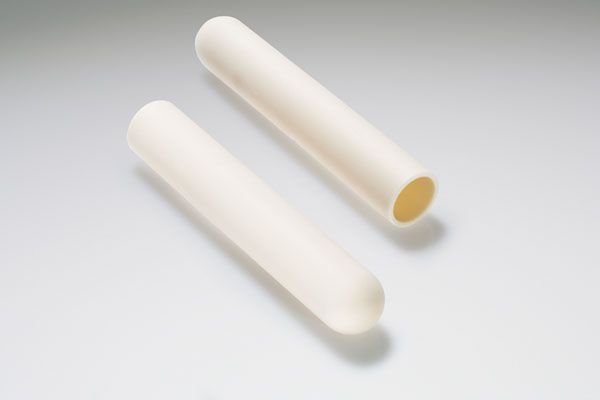
Why the choice of alumina as a material?
Alumina is a refractory technical ceramic. With a melting temperature of over 2000 °C in its pure state, it offers excellent resistance to high temperatures. This high-performance material also has high dimensional stability and is highly resistant to wear, corrosion and abrasion. These properties ensure that alumina jackets can be utilised at very high temperatures or with any product, even corrosive ones. It is therefore possible to manufacture sheaths for protection against heat as an insulating material, against the environment as an insulating sheath or against products with which the glove finger comes into contact. In addition, the good wear resistance of aluminum oxide also makes it possible to make products with a long operational life. On the other hand, the very low electrical conductivity of alumina makes it an excellent electrical insulator. This property is essential for cable protection sheaths. Finally, this material is a good thermal conductor, which makes it ideal for protecting temperature measuring instruments: it allows the safety of the equipment while ensuring the accuracy and speed of measurements.
DEGUSSIT AL23 alumina is 99.7% pure and contains very little flux (and a very low silica concentration below 100 ppm). Sheaths made of this ceramic can be utilised at higher temperatures than the majority of alumina sheaths on the market (1950 instead of 1700 °C).
Available ceramic sheath sizes
We offer a wide range of alumina ceramic sleeves (or glove fingers) in our standard product line. In particular, we have DEGUSSIT AL23 or DEGUSSIT AL24 alumina protection sleeves. The outer diameters vary from 3 mm to 80 mm. The price of the sheaths for a given diameter varies with their length. The maximum length of the tubes depends on their diameter. For example, from 30 mm diameter onwards, the duct cannot exceed 800 mm in length. However, a 16 mm diameter tube can be up to 2100 mm long.
Our standard products also include protection tubes for standard thermocouples. They are made of alumina DEGUSSIT AL23 or DEGUSSIT AL24. Their diameter varies between 8 mm and 24 mm and their length can go from 200 mm to 2100 mm.
We also offer sheaths for oxygen probes. They are made of zirconia DEGUSSIT FZY. Their outer diameter varies between 6 mm and 15 mm and their length between 400 mm and 1000 mm.
The wall thickness of our tubes is constant, even at the closed end. Our products have an excellent dimensional stability and tightness thanks to the purity and homogeneity of their microstructure, which makes it possible to maintain this constant thickness even at high temperatures.
View standard catalog products
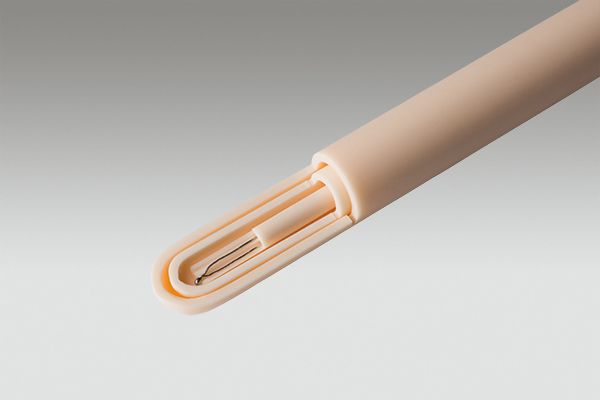
In what areas are alumina sheaths used?
Alumina insulating sleeves can be used for the protection of electrical wires: they can insulate electrical wires from each other and especially protect the soldering of platinum and platinum-rhodium thermocouple wires in a hot, corrosive and abrasive environment. There are also sheaths for oxygen probes.
Alumina sheaths are also thermal protection sheaths. They are therefore ideal for high temperature utilisations. They are for example regularly used for temperature measurements. In industry as well as in research and development, very high temperatures have to be measured accurately and quickly. Thermocouples are thermal measuring instruments based on the Seebeck effect. They are often used for measurements in industrial furnaces or in the laboratory. An alumina sheath can be used to protect them from extreme heat and corrosive products (since aluminum oxide resists abrasion and corrosion). Moreover, alumina is a very good thermal conductor, which makes temperature measurement much easier and faster.





